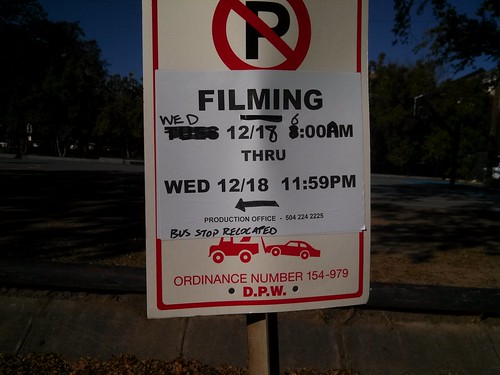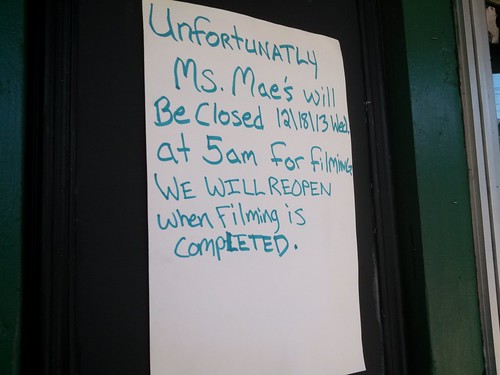
For those of you blessed to have missed Tyler Perry's nationally televised Passion play through the streets of downtown New Orleans last night, Gambit is happy to provide an eyewitness account. I think this paragraph captures it.
Trisha Yearwood nailed her closing number, a moving cover of Lifehouse's "Hangin' on Another Day," and the audience rejoiced (politely) as Yolanda Adams and the Preservation Hall Jazz Band struck up "When the Saints Go Marchin' In," but in the end this was a made-for-television event, designed to sell advertising slots to Walmart and God's Not Dead 2. The rough edges were sanded clean the moment the procession dissipated into the night somewhere along Decatur, as tourists returned to their hotels and residents to their homes.For a few hours, a production team superimposed its own alternate reality on our familiar public space before disappearing into the quiet again. It's very much like a Carnival parade, really. Which is one reason the #KreweOfJesus tag was pretty clever last night. Little disruptions like this are different from a parade in one key regard, though. They aren't staged for the benefit of the public whose facilities they commandeer.
We're pretty well used to such scenes at this point. Several times per year now some film production, or megacorporate sporting event or some such takes over a block or two of the available parking, or restricts access to streets and parks and sidewalks. Sometimes it goes on for weeks at a time. And it's not only happening downtown but probably in your neighborhood too.

It would be at least some small comfort to know that these entities were paying us back for the privilege. But, no, of course it doesn't work that way. We pay them. We pay them very well, in fact. Here's The Advocate's special report from 2014 on the film tax credit.
Last year, 107 such projects qualified for help from Louisiana taxpayers, at an upfront cost to the state budget of about $250 million. Stephen Moret, Jindal’s secretary of Economic Development, says he thinks that figure could double within a few years.At last glance the state is facing a budget shortfall for next year of something like $750 million. When the next special session convenes, it might be a good idea to take another look at massive giveaways like the Hollywood South program. It won't be easy. Even the modest limits imposed on the boondoggle last year faced strenuous opposition from industry lobbyists and the legislators they own. We'd like to hope that the dire fiscal situation would scare some sense into some folks, but there's little evidence so far that this is happening.
The program, the richest of its kind in the country, covers between 30 and 35 percent of in-state production costs, including eight-figure actor salaries, as long as a film’s local costs top $300,000. The subsidy is so large that it completely changes the economics of filmmaking. And its size has probably contributed to the program’s history of corruption as well, tempting some dishonest film producers into padding their expenses so they can recoup more money.
In the meantime, our streets, parks, and tax dollars are purposed toward the production of religious-commercial products like Tyler Perry's Parade of Jesus Featuring Creed. According to its tax credit application, The Passion's estimated budget is around $11 million. We're still waiting to find out how much of that the state will absorb.
When we find out, though, will someone please alert John Kennedy? He needs something worthwhile to complain about.
Update: Apparently there's been some discussion in Baton Rouge on this very topic today.
Morrell said votes to remove exemptions and end tax credits could occur in a special session later this year if the governor issues a call or during the regular session in 2017. Legislators can't deal with tax issues in even-numbered years during a regular session.Nothing until the special session at the earliest. And even then, probably nothing.
Legislators have for years put in place various tax credits and exemptions from the sales tax to create incentives for people doing business in the state or to provide favored groups a shelter from the state's sales tax, which on average, is among the highest in the country.
But critics have long complained that it's not clear whether the tax credits provided to business are worth what they cost the state. And some of the tax credits are regarded as more corporate welfare than economic development efforts.
It's not likely to get any easier for Legislators. The generous film tax credit program, which has been among the most controversial incentive programs, is likely to prompt intense pressure from the film industry to keep the tax credit in place.Get used to paying the extra sales tax. It's all your legislators have the courage to ask anyone for.
Upperdate: Answer is about $3 million.
Exactly how much “The Passion” will receive in credits won’t be determined until late this year, after the company submits its receipts and the state has a chance to audit them.Somebody really ought to alert the Treasurer to this mess. He seems eager to help. But he could use some help understanding how.
The audit is a new requirement this year under laws aimed at trimming costs to the state and ensuring productions actually spend the money they claim.
Under the program, productions receive credits worth 30 percent of the amount they spend in Louisiana and 40 percent of the amount they spend on payroll, including what they spend on performers who are in the state only for filming. Companies can sell those credits or claim them at slightly reduced value from the Louisiana Department of Revenue if their tax liabilities are less than the amount of credits they receive.
No comments:
Post a Comment